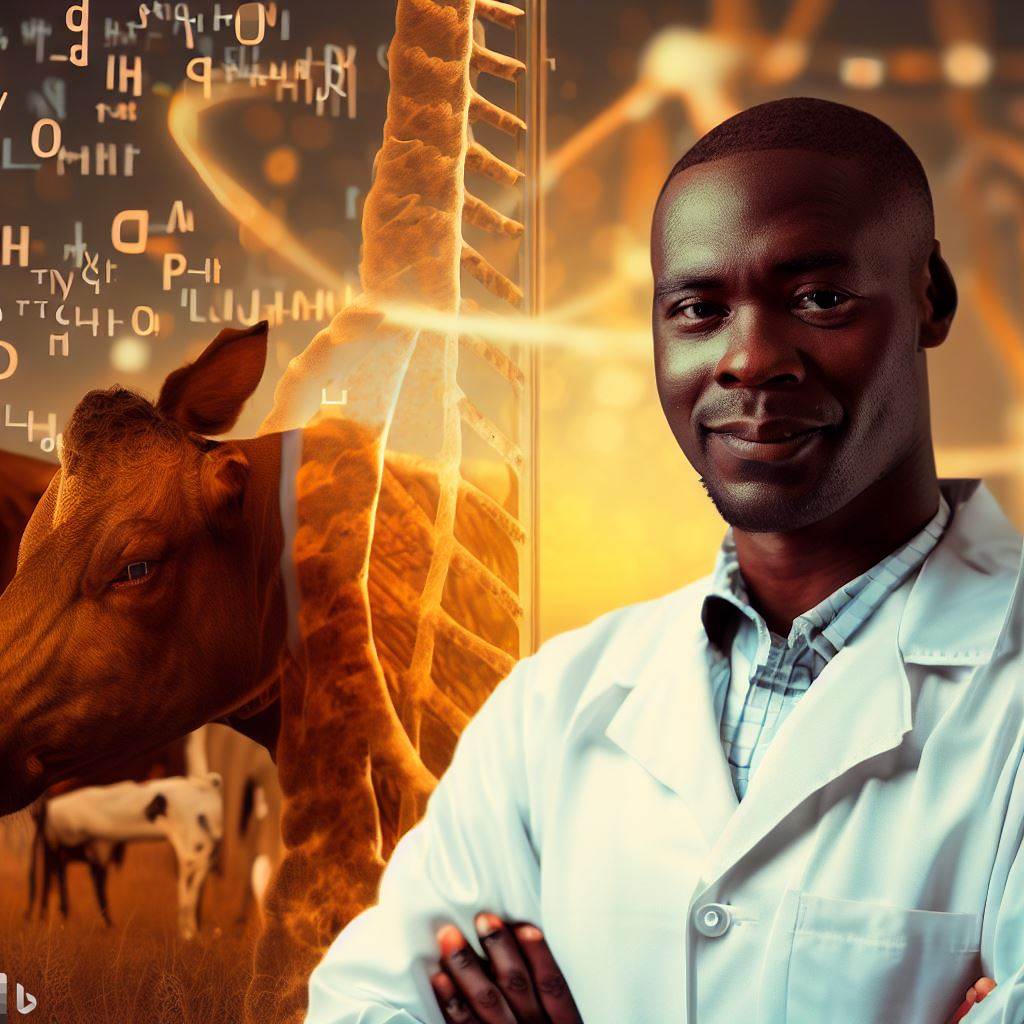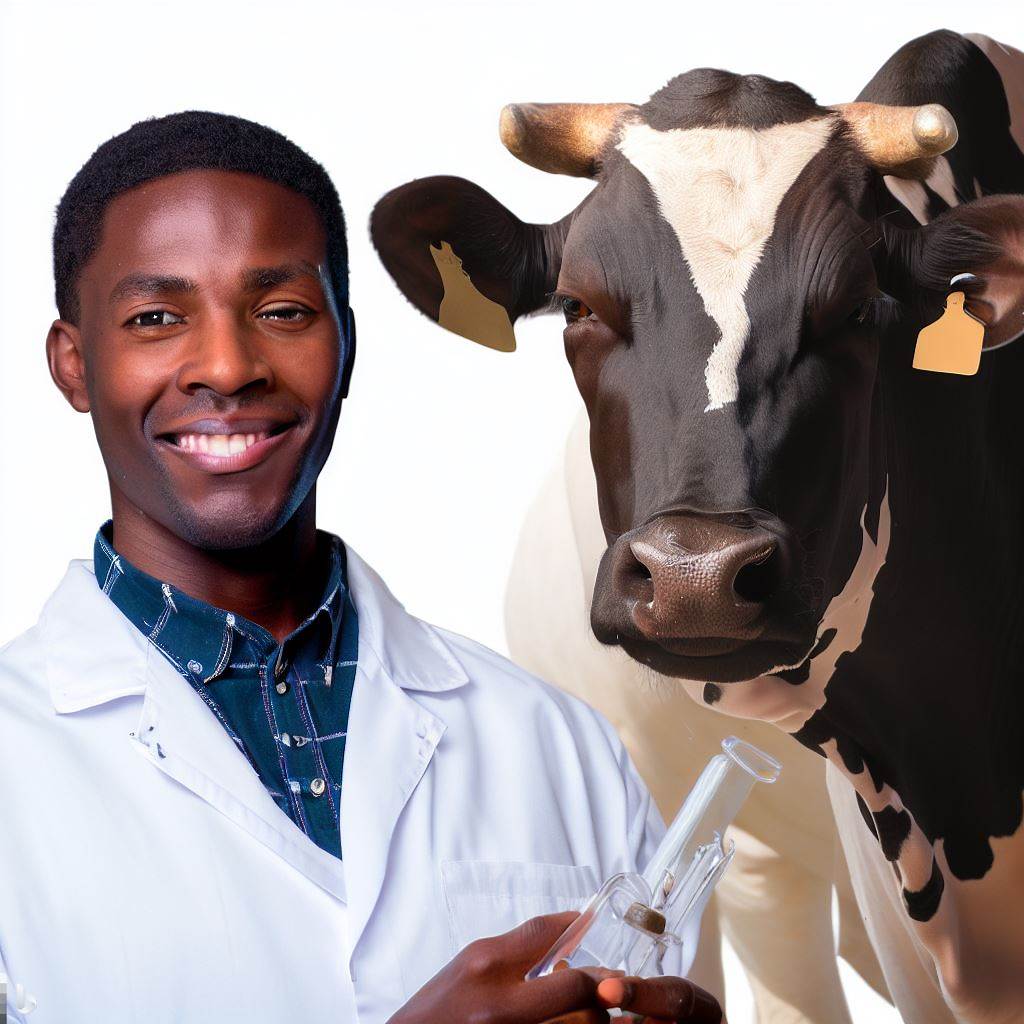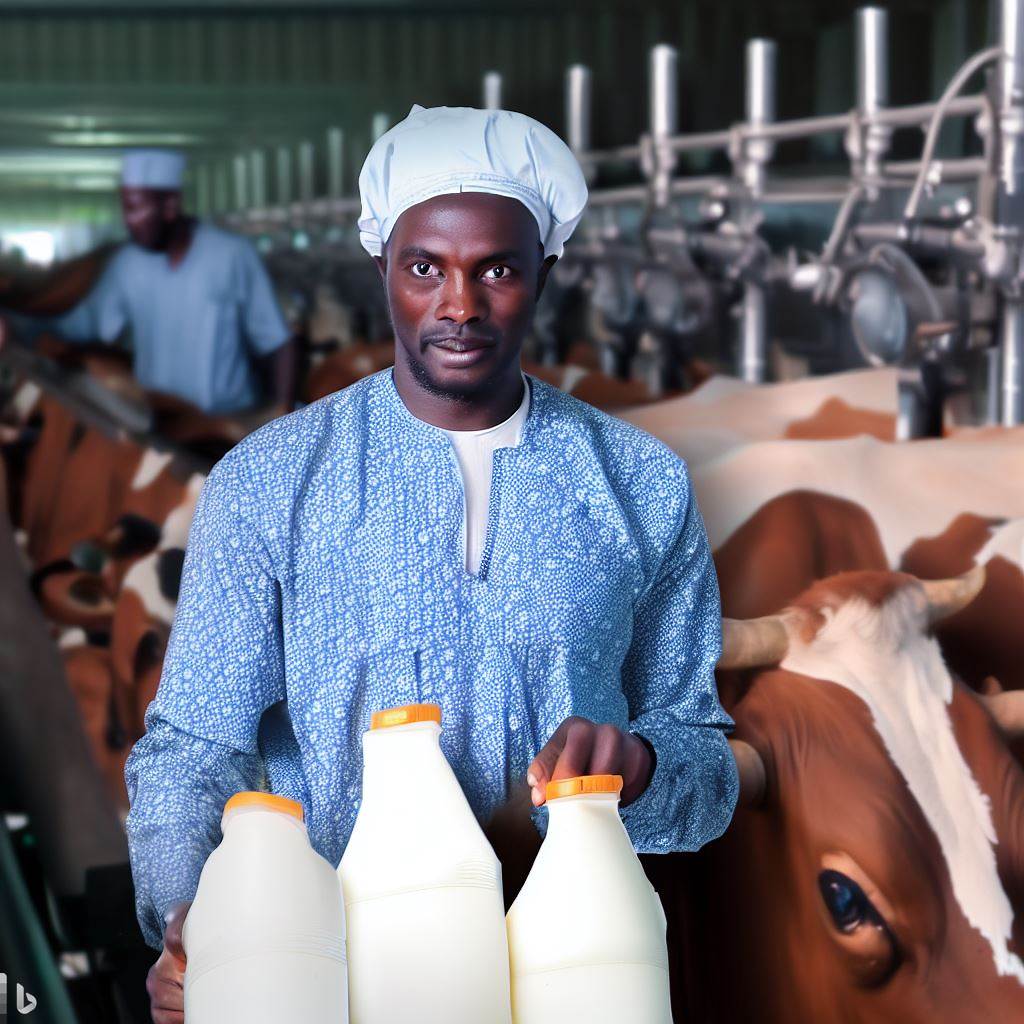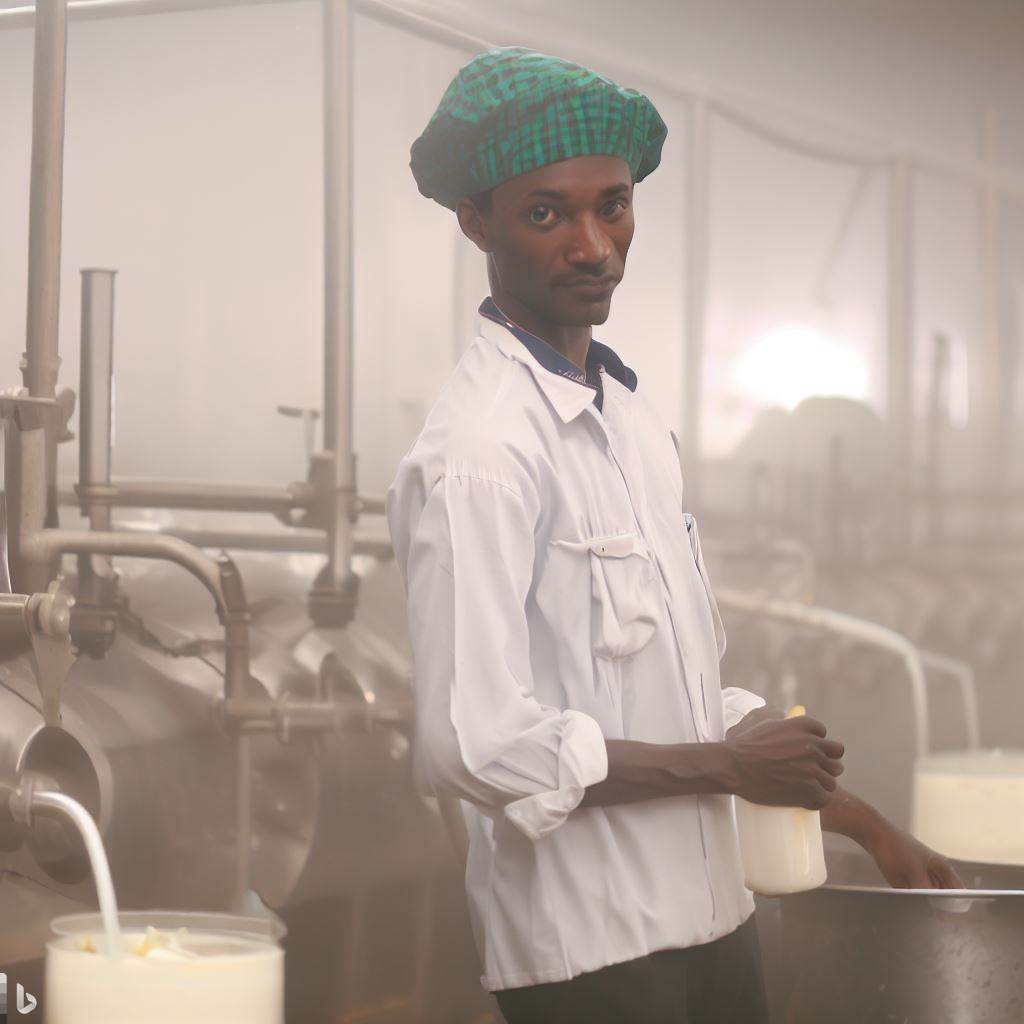Introduction
Let’s see if animal geneticist are the answer to Nigeria food security!
Animal Geneticist in Nigeria
Animal geneticists in Nigeria play a pivotal role in enhancing food security through their innovative work.
By focusing on the genetic makeup of livestock, these experts aim to improve animal traits for better productivity and resilience.
Significance of their Work for Food Security
Their efforts contribute to:
- Increased Yield: Animal geneticists enhance breeding methods to develop livestock that yield more meat, milk, and eggs.
- Disease Resistance: Through genetic selection, animals become more resistant to common diseases, reducing losses.
- Local Adaptation: Geneticists tailor breeds to Nigeria’s environment, ensuring animals thrive in varying conditions.
- Nutritional Value: Genetic improvements lead to livestock products with higher nutritional content, addressing malnutrition.
- Sustainable Farming: Resilient livestock reduce the environmental impact of farming, promoting long-term sustainability.
As Nigeria faces challenges like population growth and climate change, animal geneticists provide valuable solutions for a food-secure future.
Overview of Animal Geneticist
In this section, we will explore the role and importance of animal geneticists in Nigeria’s quest for food security.
What is an Animal Geneticist?
An animal geneticist is a professional who specializes in studying genetic traits and breeding patterns in animals.
They conduct research to identify and analyze genes that influence productivity, disease resistance, and other desirable characteristics in livestock.
By understanding and manipulating animal genetics, they aim to enhance livestock quality and contribute to food security.
The Role and Responsibilities of an Animal Geneticist
An animal geneticist plays a crucial role in the development of sustainable livestock farming practices. They work closely with farmers and breeders to select and breed animals with superior genetic traits.
They study the heredity of traits, such as milk production, growth rate, and meat quality, to improve overall livestock performance.
Animal geneticists also collaborate with veterinarians to identify and resolve genetic disorders in animals.
They are responsible for conducting genetic tests and developing breeding programs to maximize desirable traits.
The Importance of Animal Geneticists in Improving Livestock Quality
Animal geneticists are crucial in ensuring sustainable food production and improving livestock quality.
By selectively breeding animals, they can enhance desirable characteristics, such as disease resistance and reproductive efficiency.
This leads to healthier and more productive livestock, ultimately increasing food availability. Animal geneticists also contribute to the conservation of rare and endangered livestock breeds.
They identify and preserve valuable genetic traits, ensuring the diversity and resilience of livestock populations.
In the end, animal geneticists play a vital role in Nigeria’s pursuit of food security.
Through their expertise in studying and manipulating animal genetics, they contribute to the development of improved livestock breeds.
Their collaboration with farmers and breeders ensures the selection and breeding of animals with superior genetic traits, leading to more productive and resilient livestock.
By maximizing desirable characteristics and preserving genetic diversity, animal geneticists help to secure Nigeria’s food supply for the future.
Read: A Day in the Life of a Nigerian Animal Geneticist
Current Challenges in Nigeria’s Food Security
When it comes to food security, Nigeria is facing numerous issues and challenges that need urgent attention.
These challenges range from inadequate food production to inefficient livestock production systems. To address these challenges, sustainable and efficient livestock production is crucial.
This is where animal geneticists can play a significant role.
Inadequate Food Production
The ever-increasing population in Nigeria has put immense pressure on food production. Insufficient agricultural practices and limited access to modern technologies hinder food production.
Poor infrastructure and lack of proper storage facilities contribute to post-harvest losses. The current farming system is not sustainable enough to meet the growing demands for food.
Inefficient Livestock Production
Nigeria’s livestock production system is highly inefficient and lacks proper planning. Low-quality feeds and limited access to veterinary care affect livestock health and productivity.
Inadequate breeding programs result in low-quality and low-yield livestock breeds. Inefficient meat and dairy processing facilities hinder value addition and economic growth.
Poor animal identification and traceability systems hamper disease control and market access.
Role of Animal Geneticists in Addressing Challenges
Animal geneticists specialize in studying and improving the genetic makeup of livestock. They can identify the traits that are important for livestock productivity, health, and resilience.
Through selective breeding, animal geneticists can develop high-yield and disease-resistant livestock breeds.
Animal geneticists contribute to improving the efficiency of livestock production systems. They work on developing sustainable feeding strategies for livestock to enhance productivity.
Animal geneticists also focus on enhancing the quality and nutritional value of meat and dairy products. They collaborate with farmers and provide training on proper animal management and breeding techniques.
Animal geneticists help establish efficient animal identification and traceability systems for disease control. They play a crucial role in promoting the use of modern technologies in livestock production.
In essence, Nigeria faces significant challenges in ensuring food security. Inadequate food production and inefficient livestock production systems contribute to these challenges.
However, animal geneticists can contribute significantly to overcome these obstacles.
By applying their expertise in improving livestock genetics and breeding, sustainable and efficient livestock production can be achieved.
Collaborative efforts between animal geneticists, farmers, and policymakers are necessary to address the current issues and challenges related to food security in Nigeria.
Read: Role of Animal Geneticist in Nigeria’s Agro-economy
The Work of Animal Geneticists in Nigeria
In Nigeria, animal geneticists have been working diligently to address the nation’s food security concerns. Their initiatives and programs have been instrumental in improving livestock productivity and resilience.
Overview of Animal Geneticist Initiatives and Programs
Animal geneticists in Nigeria have established breeding programs to enhance desirable traits in livestock.
They selectively breed animals to improve characteristics like meat quality, milk production, and disease resistance.
These initiatives aim to create a more sustainable and efficient livestock industry in Nigeria.
Research and Development Activities
Animal geneticists conduct extensive research to understand the genetic makeup of different livestock breeds.
They analyze DNA samples and identify genes responsible for specific traits. By decoding the genetic information, they develop breeding strategies for optimal outcomes.
Furthermore, they collaborate with other scientists to explore advanced genetic technologies.
Examples of Successful Animal Geneticist Projects in Nigeria
The “Improved Indigenous Livestock Productivity Project” focuses on enhancing the productivity of indigenous Nigerian livestock breeds.
Through selective breeding, this project has successfully increased the meat yield and disease resistance of local cattle.
The “Dairy Genetic Improvement Program” aims to boost milk production in Nigerian dairy cattle.
Animal geneticists have introduced superior dairy genetics through artificial insemination techniques, resulting in higher milk yields.
Another notable project is the “Poultry Breeding Program,” which aims to develop highly productive and disease-resistant poultry breeds.
Geneticists have used data-driven techniques to identify superior genetic lines and improve poultry meat and egg production.
The efforts of animal geneticists in Nigeria have yielded significant results in terms of food security:
Improved breeding programs have increased the quantity and quality of meat and dairy products available for consumption.
Through selective breeding for disease resistance, livestock losses due to illnesses have been significantly reduced.
The availability of disease-resistant and productive livestock breeds has provided a more stable source of income for farmers.
The increased productivity and resilience of livestock contribute to Nigeria’s overall food security and self-sufficiency.
In fact, animal geneticists in Nigeria play a vital role in ensuring food security by applying their expertise in breeding and genetics.
Their initiatives and programs have led to significant improvements in livestock productivity, disease resistance, and overall agricultural sustainability.
Through ongoing research and collaboration, they continue to develop innovative strategies to further enhance Nigeria’s agricultural sector and meet the nation’s growing food demands.
Read: Inspiring Stories of Nigerian Animal Geneticists
Impact on Food Security
Animal geneticists play a crucial role in improving food security in Nigeria through various strategies and techniques.
- Contribution to improving food security: Animal geneticists work towards increasing livestock production and ensuring a sustainable food supply for the growing population.
- Development of superior animal breeds: By selectively breeding animals, geneticists can enhance their desirable traits such as growth rate, disease resistance, and adaptability to local conditions.
- Enhanced productivity: The development of superior animal breeds leads to higher productivity in terms of meat, milk, and eggs, thus meeting the increasing demand for animal protein.
- Increase in livestock production: Through careful genetic selection, animal geneticists can significantly boost livestock numbers, resulting in a greater quantity of meat, milk, and other livestock products.
- Improved genetic quality: Animal geneticists focus on identifying and eliminating harmful genetic disorders from animal populations, ensuring healthier and more productive livestock.
- Adaptability to local conditions: Animal geneticists select and breed animals that are better adapted to local environmental conditions, increasing their resilience and reducing production risks.
- Sustainable farming practices: Animal geneticists promote sustainable farming practices by developing breeds that require fewer resources, produce less waste, and are more efficient converters of feed into protein.
- Diversification of livestock: Geneticists work to develop and improve diverse livestock breeds, ensuring a wider range of choices for farmers and consumers.
- Preservation of indigenous breeds: Animal geneticists play a vital role in preserving indigenous breeds that are well-suited to the local environment and culture, protecting genetic diversity.
- Economic benefits: The work of animal geneticists leads to increased economic opportunities for farmers, as higher-quality livestock fetch better prices in the market.
Their efforts result in increased livestock production, improved genetic quality, and the development of superior animal breeds that can thrive in local conditions.
Read: Challenges Faced by Animal Geneticists in Nigeria
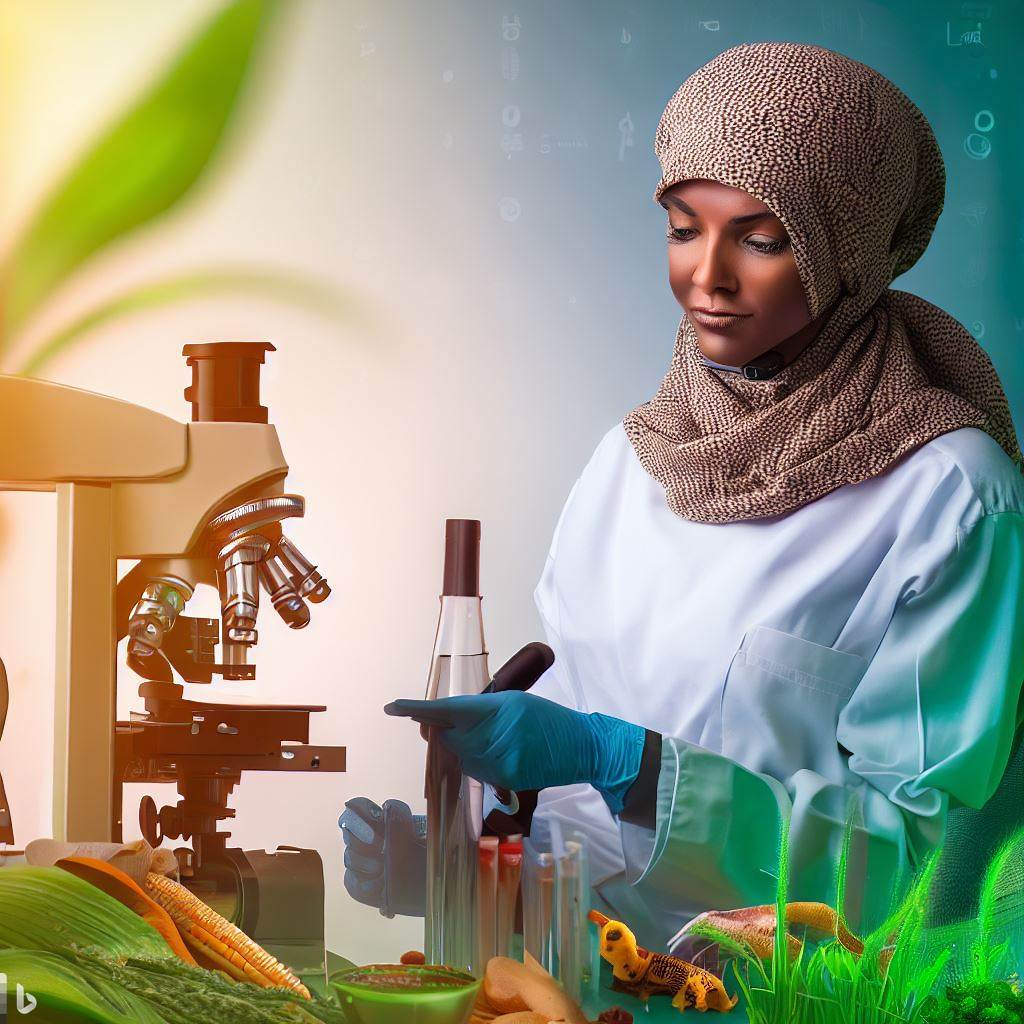
You Might Also Like: The Role of Livestock in Nigeria’s Food Security
Collaborations and Partnerships
Collaborations between animal geneticists, relevant institutions, and stakeholders play a vital role in addressing Nigeria’s food security challenges.
These partnerships are essential for developing innovative solutions and implementing effective strategies.
Importance of Collaborations
Collaborations facilitate the exchange of knowledge, expertise, and resources, leading to the development of robust breeding programs and improved genetic traits in livestock.
By working together, animal geneticists can maximize their research potential and contribute to sustainable food production.
Furthermore, collaborations allow for the pooling of financial resources, which is crucial for conducting large-scale research projects, establishing breeding centers, and implementing advanced technologies.
The synergy created through collaborations accelerates progress and helps overcome the limitations of individual efforts.
Partnerships with Government Agencies, Universities, and Farmers’ Associations
Partnerships with government agencies are vital to gaining access to funding, policy support, and regulatory frameworks.
Animal geneticists must collaborate with these agencies to align their research objectives with national priorities and secure necessary resources.
Universities play a crucial role in providing the platform for education, research, and knowledge dissemination.
Collaborating with universities allows animal geneticists to access cutting-edge infrastructure and work closely with students and faculty members, fostering innovation and building capacity in the field.
Farmers’ associations are a crucial stakeholder group with intricate knowledge of the practical aspects of agriculture.
Collaborating with them ensures that research efforts align with farmers’ needs, promotes adoption of new genetic technologies, and facilitates knowledge transfer between researchers and farmers.
Examples of Successful Collaborations
Collaboration between Animal Geneticists and Agricultural Research Institutes
Animal geneticists in Nigeria have partnered with agricultural research institutes to develop indigenous breeds that are well-adapted to local climate conditions and diseases.
Through joint efforts, they have successfully bred cattle and poultry varieties that exhibit increased productivity and resilience.
This collaboration resulted in the introduction of the “Nigerian Indigenous Chicken,” which demonstrates improved disease resistance and faster growth rates.
By preserving and enhancing indigenous breeds, the collaboration contributes to the conservation of genetic diversity and supports sustainable food production.
Partnership between Animal Geneticists and Non-Governmental Organizations (NGOs)
NGOs focusing on agriculture and rural development have played a significant role in supporting animal geneticists in Nigeria.
These partnerships have facilitated capacity-building programs, provided technical assistance, and mobilized resources for research and development activities.
For instance, a collaboration between an animal geneticist team and a prominent NGO led to the establishment of a state-of-the-art livestock breeding center.
This dedicated facility aims to improve the genetic potential of local breeds through selective breeding and modern reproductive technologies.
Synergistic Efforts between Animal Geneticists and Farmers’ Associations
Farmers’ associations have actively collaborated with animal geneticists to adopt improved breeding practices and increase livestock productivity.
Publish Your Professional Profile, Business or Brand
Showcase your expertise, gain trust, and boost visibility instantly on Professions.ng.
Publish NowBy involving farmers in research trials and knowledge-sharing activities, animal geneticists have been able to develop practical solutions tailored to the local context.
In one successful collaboration, animal geneticists worked closely with a farmers’ association to introduce high-yielding goat varieties with enhanced resistance to common diseases.
This initiative significantly improved the livelihoods of participating farmers, leading to increased incomes and improved food security in the region.
Collaborations and partnerships are the backbone of Nigeria’s efforts to achieve food security through animal genetics.
By working together, animal geneticists, relevant institutions, and stakeholders can harness their collective strengths and resources, fostering innovation and sustainable development in the agricultural sector.
The examples mentioned highlight the success that can be achieved through collaboration.
However, it is crucial to continually strengthen these partnerships, prioritize research funding, and ensure effective knowledge dissemination to maximize the impact of animal genetics on food security in Nigeria.
Future Prospects and Challenges
As animal geneticists in Nigeria look to the future, there are several prospects and challenges on the horizon.
The advancements in genetics technology hold great potential for their work.
Future Prospects of Animal Geneticists in Nigeria
Animal geneticists can play a crucial role in addressing the challenges of food security in Nigeria. They can contribute to the development of genetically improved and disease-resistant livestock breeds.
Animal geneticists have the opportunity to enhance the productivity and efficiency of Nigeria’s livestock industry.
Their expertise can lead to the production of high-quality animal products. Animal geneticists can contribute to the preservation and conservation of indigenous livestock breeds.
Potential Impact of Advancements in Genetics Technology
Advancements in genetics technology can revolutionize the work of animal geneticists in Nigeria.
New techniques such as genetic engineering and gene editing can accelerate the genetic improvement of livestock.
These advancements can expedite the development of desirable traits in animals, such as increased milk or meat production.
Genetic technology can also aid in the identification and elimination of genetic diseases in livestock populations.
Animal geneticists can utilize genomic selection to identify the most genetically superior animals for breeding purposes.
Challenges and Limitations
Limited funding and resources can impede the progress of animal geneticists in Nigeria. Lack of awareness about the importance of genetics in livestock breeding can hinder their work.
Regulatory frameworks and ethical considerations related to genetic technologies can pose challenges.
Adoption of genetic technologies among farmers and stakeholders may be slow due to limited knowledge and skepticism.
Poor infrastructure and inadequate laboratory facilities can limit the application of genetics technologies.
Despite these challenges, animal geneticists in Nigeria remain optimistic about the future. They understand the immense potential of their work to contribute to food security and sustainable agriculture in the country.
To overcome the challenges, concerted efforts are required from government, research institutions, and the private sector.
To ensure a bright future for animal geneticists, certain actions can be taken:
- Increased investment in research and development of genetics technologies.
- Awareness campaigns to educate farmers and stakeholders about the benefits of genetics in livestock breeding.
- Collaboration between animal geneticists and policymakers to develop effective regulatory frameworks.
- Infrastructure development to support the application of genetics technologies in Nigeria.
In a nutshell, the future prospects of animal geneticists in Nigeria are promising.
The advancements in genetics technology can greatly enhance their work and contribute to addressing the challenges of food security.
However, challenges such as limited funding, awareness, and infrastructure need to be addressed for them to fully realize their potential.
With the right support, animal geneticists can help transform Nigeria’s livestock industry and ensure a sustainable and secure food supply for the future.
Conclusion
Animal geneticists play a crucial role in Nigeria’s food security efforts.
By studying and manipulating animal genetics, these scientists contribute to the development of livestock breeds that are more resistant to diseases, adapt well to different environments, and produce higher quality meat and dairy products.
The potential of animal geneticists in addressing food security challenges is immense.
With their expertise, they can help improve the productivity and efficiency of livestock production, leading to increased food availability and reduced poverty.
Furthermore, their research can contribute to the conservation and preservation of indigenous animal breeds, which helps maintain biodiversity in the agricultural sector.
It is important for readers to support and promote the work of animal geneticists in Nigeria.
By advocating for proper funding and resources for research, we can ensure the continuous development of sustainable livestock farming practices and ultimately enhance food security in the country.
Additionally, individuals can also contribute by consuming and supporting locally sourced animal products, as this supports the livelihoods of small-scale farmers and encourages the conservation of indigenous breeds.
Animal geneticists have the potential to significantly impact Nigeria’s food security.
Their work can lead to the development of resilient livestock breeds and the improvement of livestock production systems, ultimately ensuring a more stable and sustainable food supply.
It is crucial for individuals, organizations, and policymakers to recognize and support the valuable contributions of animal geneticists in addressing Nigeria’s food security challenges.

